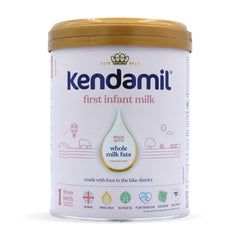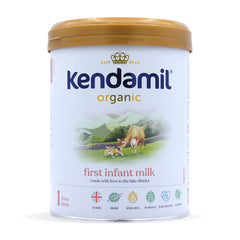What Makes a Baby Formula Truly Organic? Certifications Every Parent Should Know
In the world of baby food, the word “organic” has become a real magnet for parents. Store shelves are lined with packages adorned with green leaves and the word “organic,” but are they all of the same quality? Unfortunately, marketing sometimes outpaces reality.
What makes baby formula organic is a question every parent should explore before going to the store. After all, behind the attractive packaging could be either a truly high-quality organic baby formula or a regular formula with a fancy name.
A genuine organic baby formula undergoes strict certification, meets international standards, and has documented proof of its quality. Today, we will tell you which certificates to look for and how to avoid falling for marketing tricks.
Organic Formula vs Regular Formula – The Key Differences
Parents are often looking for quality formulas that will provide good nutrition for babies. Usually, organic formulas can be less affordable and more expensive than conventional options. Everyone can turn to Organic Life Start and evaluate authentic European baby food. Organic baby food is an excellent choice for parents who prioritize specific production standards for their babies.
Today, the question of assessing organic vs non-organic formula remains relevant for many families. Research into farming methods, chemical usage, and nutrient profiles is important for informed decisions.
Organic baby formula:
-
The formula is made from cow or goat milk sourced from certified organic farms.
-
The formula does not contain antibiotics or growth hormones used in conventional farming.
-
Raw materials from organic farms exclude the use of synthetic chemical fertilizers and pesticides.
-
The formula does not contain artificial flavors, colors, or certain preservatives.
-
The formula is enriched with essential vitamins, minerals, and often probiotics to support digestion.
Conventional baby formula:
-
The formula is made from milk of cows raised on traditional farms using standard agricultural practices.
-
The formula may contain ingredients from conventional farming, which follows different standards than organic.
-
In comparing non-GMO formula vs regular formula, conventional options may include ingredients like palm oil or corn syrup.
-
There is quality control of products, but it follows different standards than organic certification requires.
Researching formula options helps parents choose what works best for their babies. GMO-free formula is made without genetically modified ingredients and may appeal to parents seeking specific production methods. Often, conventional formula is a practical option for parents whose children have typical digestion and no specific sensitivities.
Why Certifications Matter for Organic Baby Formula
Among the variety of baby formulas available, parents seek the most suitable option for their family. Quite often, parents are interested in "Is organic formula better?" and what makes certified formulas a preferred choice. Certifications serve as the primary indicator of production standards and ingredient sourcing. Certificates play an important role in verifying the formula meets specific organic requirements. Here is key information about organic infant formula certifications:
-
USDA Organic. This certification guarantees that the formula is produced without synthetic fertilizers and meets strict organic standards. The certification ensures avoidance of GMOs and synthetic pesticides according to USDA requirements, providing transparency for parents.
-
EU Organic. This certification guarantees that ingredients come from farms following European organic standards. There are controlled conditions for animal welfare and feed quality. The certification restricts the use of various preservatives, artificial flavors, and synthetic colors.
-
UK Soil Association. This certification provides quality assurance through regular inspections of producers and farms for ingredient standards. The certification ensures transparency between consumers and producers regarding ingredient sourcing and manufacturing processes.
Kendamil Classic vs Organic – What's the Difference?
Parents often pay attention to the difference between Kendamil organic and regular versions. Both types of formula are quality options, but they appeal to different family preferences. The assessment of ingredients, composition, sourcing, and production standards plays an important role in decision-making. Both options are produced in the UK and meet high manufacturing standards. The distinction between the two options is one of the key differences that is important for parents to consider.
-
Ingredients. Kendamil Classic has an excellent composition using high-quality milk sources. The formula is made without palm oil and contains natural fatty acids from whole milk. Kendamil Organic offers similar composition with the additional assurance of certified organic milk sources. The organic formula avoids synthetic pesticides, antibiotics, and other substances restricted by organic standards.
-
Sourcing and standards. In comparing Kendamil Classic vs Organic, the classic option is made from high-quality conventional milk that meets standard safety requirements. The organic option follows additional organic certification standards and has enhanced oversight of farming practices.
-
Nutritional profile. Both versions contain essential nutrients and beneficial fats necessary for infant development. DHA, ARA, iron, vitamins, and minerals are included in both formulations. The organic version emphasizes minimal processing and clean ingredient sourcing for families with specific preferences.
-
Price. Usually, the classic version is more affordable and offers broader accessibility for families. The organic version typically costs more and appeals to environmentally conscious parents willing to pay for certified organic standards.
-
The right choice. Choosing between Kendamil organic vs regular requires considering individual family values and baby's needs. High quality is available in both versions, with the organic option providing additional certification for those who value controlled farming practices.
Is Organic Formula Really Better for Babies?

Today, organic formulas are reaching new popularity and becoming a frequently chosen option. However, when examining the issue more closely, conventional formulas can also provide excellent nutrition. Organic products have advantages due to certification and controlled production methods. It is certifications that help parents understand the sourcing and production standards used in the formula. In the question of organic formula vs regular, it is important to consider the individual child's needs and family preferences. Here are the key characteristics of organic baby formulas:
-
Clean ingredient sourcing is a key feature due to controlled farming practices. The ingredients are sourced from certified organic farms, which appeals to parents prioritizing specific agricultural methods. Organic ingredients avoid synthetic pesticides and other chemicals restricted by organic standards.
-
Minimal artificial additives make organic formulas appealing to parents seeking simpler ingredient lists. Certain artificial preservatives that may cause sensitivities in some children are avoided in organic formulations.
-
Gentle approach for sensitive systems. Quality organic formulas may be preferable for babies with particular sensitivities. Parents make informed choices by considering their individual baby's responses. Sensitivity to certain ingredients can be a concern, and organic formulas offer an alternative approach for families seeking controlled production methods.
How to Choose a Truly Organic Baby Formula with Confidence
The choice of formula depends on several factors that parents should carefully consider. With proper knowledge, parents can select options that are safe and appropriate for their babies' health. Determining whether truly organic baby formula is the right choice will help families make confident decisions. Here is how to confidently choose a quality organic formula:
-
Certification marks play an important role and verify the production standards of the formula. Proper certification marks provide assurance about farming practices and ingredient sourcing. Certificates are important for families choosing formulas with specific production standards and controlled ingredient sourcing.
-
Comparing ingredient lists plays an important role, especially when considering different formula options. Each formula is unique and contains different ingredient combinations depending on the manufacturer's approach to infant nutrition.
-
Considering the individual child's needs is essential for making the best choice. Many children have specific requirements, and consultation with a pediatrician will help determine the most suitable formula option. Anyone can contact us and get information about European organic formulas available through our service.









